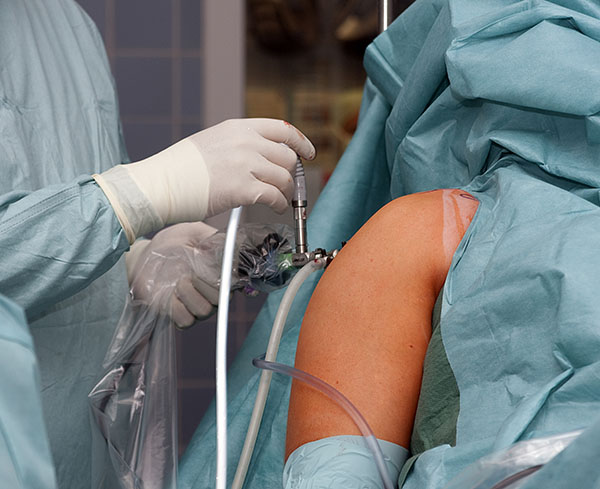January 17th, 2019

Shoulder problems such as a rotator cuff tear, bone spurs, and ligament damage can make everyday tasks difficult, or even painful. Acute injury from an accident or sports injury, or the effects of arthritis after years of overuse may result in even more severe forms of shoulder pain and discomfort. What can you do to eliminate this discomfort? There are several treatment options for injured shoulders, with surgical options explored as a last resort. Because every patient is different, orthopedists have developed multiple treatment options allowing for a program to be tailored to your specific needs.
Here is a guide to two of the most common surgical treatment procedures after conservative measures have proven unsuccessful: arthroscopy and open surgery.
Open Shoulder Surgery
Open surgery refers to a traditional, surgical approach to addressing problems with connective tissue in the shoulder. A shoulder orthopedic surgeon will make an incision of about 5 cm just above the affected area that they need to access under the skin and muscle.
Arthroscopy
Meaning "instrument for viewing joints", this surgical alternative, considered less-invasive than traditional open surgery, refers to the use of special instruments to access the shoulder's connective tissue. Tiny, 5 mm incisions are made to be just large enough for these instruments to be inserted under the skin. They include a special, tiny camera that allows surgeons to see your joints and work on them accordingly.

Treatment Goals
Arthroscopic surgery is a newer approach to shoulder orthopedic treatments, however some people may question whether newer necessarily means better. Overall, arthroscopic surgery is designed to minimize recovery times. Small incisions and more tolerable techniques make shoulder surgery less invasive and require less hospitalization time. Patients can ideally return to their former activities sooner than they would with open surgery. One of the chief goals of arthroscopic surgery is to not only treat shoulder conditions but to treat them in such a way that doesn't have lasting negative impacts on the patient.
In fact, many members of the scientific community found that arthroscopic rotator cuff repair had the same or better results than those achieved with open surgery. As reported, their patients experienced less pain and an increase in mobility after an arthroscopic shoulder procedure. One might wonder why open surgery is still in practice following the results of these studies.
Prioritizing the Patient
It is important to note, however, that arthroscopic surgery may not be appropriate for treating a particular patient or type of shoulder condition. While recovery times are longer for open surgery, the size and scope of the work done during open surgery may be necessary for intensive work, like total shoulder replacement surgery. Opening the shoulder gives surgeons the ability to work with more precision and care.
Open surgery may also be a necessity in order to prevent complications. Certain procedures are more delicate than others, like total shoulder replacement surgery, and the increased working space that open surgery provides increases their chances of successfully treating the patient.
Overall, more severe conditions and more intensive procedures may be too difficult for an arthroscopic approach to be suitable.
Learn More
If you want to learn more about shoulder surgeries, visit a local orthopedic surgeon. If you're suffering from an injury, have chronic shoulder pain or discomfort, or have noticed decreased mobility, then you may need treatment. Should you eventually need surgery, an experienced and board-certified orthopedist from OrthoAtlanta can determine whether arthroscopic or open surgery is appropriate for you. Whether you need a shoulder replacement in Atlanta, or something more minor like the treatment of bone spurs, you can trust a specialist from OrthoAtlanta to make the right choice for your health, budget, and recovery concerns.
Back






